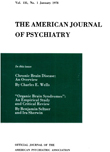BRIEF PSYCHOTHERAPEUTIC INTERVIEWS IN THE TREATMENT OF EPILEPSY
Abstract
Brief psychotherapeutic interviews try to utilize the dynamic knowledge of the individual patient's past life and to apply it to a satisfactory adjustment to the present. His hopes and plans for the future are constantly taken into consideration. Difficulties which precipitate maladjustments are reviewed from the same point of view. The treatment considers impaired functions, such as disorders of attention, concentration and thinking, in the technique of the interview. Recurrent resentment and anxiety may be relieved through a necessarily very limited analysis and their intensity reduced. The persistence of these destructive emotions as well as the presence of other psychopathological symptoms may limit or prevent an analysis which would give the patient an understanding of the dynamic factors. In order to proceed one must correct the factors which lead to therapeutic obstructions or attempt the dynamic analysis when the patient becomes ready for it. This type of psychotherapy must use a plan of treatment which covers a long period of time and which is reconsidered and modified whenever psychopathological changes or psychodynamic, somatic or environmental factors make it necessary. The results of the patient's adjustment of, and to, his life problems are encouraging enough to justify his physician's active therapy and guidance during the long period of the epileptic disorder.
Access content
To read the fulltext, please use one of the options below to sign in or purchase access.- Personal login
- Institutional Login
- Sign in via OpenAthens
- Register for access
-
Please login/register if you wish to pair your device and check access availability.
Not a subscriber?
PsychiatryOnline subscription options offer access to the DSM-5 library, books, journals, CME, and patient resources. This all-in-one virtual library provides psychiatrists and mental health professionals with key resources for diagnosis, treatment, research, and professional development.
Need more help? PsychiatryOnline Customer Service may be reached by emailing [email protected] or by calling 800-368-5777 (in the U.S.) or 703-907-7322 (outside the U.S.).



